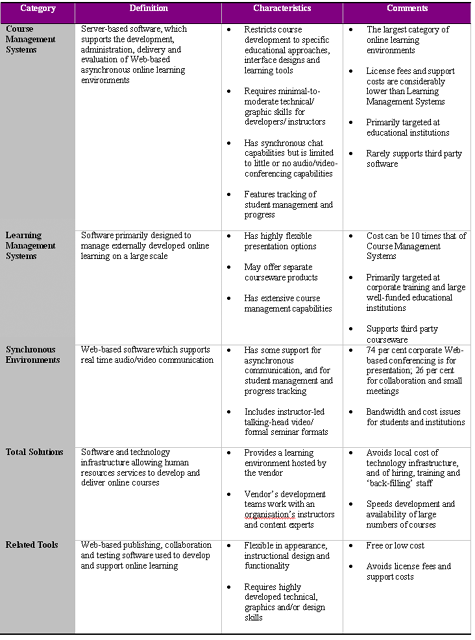 \
\Diane Belyk, Jeremy Schubert, and Jon
Baggaley
Masters of Distance Education Program
Athabasca University – Canada's Open University
For their optimal use in distance education (DE), online educational applications need to be integrated within a comprehensive course management system (CMS). Such systems are server-based software that supports the development, delivery, administration, and evaluation of online learning environments. The selection of an appropriate CMS should be considered from the multiple perspectives of the student, the course developer, the course instructor/ tutor, the technical support staff, and the DE institution’s administration. The current evaluation of CMS packages was conducted by a team of individuals with experience and contacts in relation to each of these DE user types. The report compares a series of CMS packages in terms of their range of features, and in relation to their satisfaction of international online education standards.
In general, CMS methods share these characteristics:
1. They favour a learner-centred approach, involving the following media and methods:
2. They contain a range of content tools:
3. They contain collaborative tools, involving asynchronous and synchronous communication:
4. They contain student management tools, such as:
5. They contain quiz and survey tools, such as:
Throughout the review process, the perspective of the student user was the major focus, while the other perspectives were addressed in terms of their relationship to the student. Our description and classification of products is based on the vendors’ descriptions, and on a range of earlier comparative analyses (Boston University, 2001; Centre for Curriculum, Transfer and Technology (C2T2), 2001; Consortium for Information Technology in Education (CITE), 2001; Marshall University Center for Instructional Technology, 2000; University of Illinois at Urbana Champaign, 2001; University of Manitoba; Rollinghoff, 2001; Windman, 2001). Many products identified as course/learning management systems are not marketed as such, but as “as a learning portal, best-of-breed technology, an end-to-end solution, an e-learning solution, a total solution...” (Broadbent, 2000). Companies such as e-com Inc (producer of the Theorix LMS), compete with CM systems by offering the capability of running “courses originally developed for WebCT (etc.,)” (www.theorix.com). Other vendors use the terms LMS and CMS interchangeably (CITE, 2001, p. 13; Hall, 2001). The CITE (2001) software categories have therefore been used in the analysis. These, and further descriptions of the product genres, are given in Appendix 1.
A series of 31 products was reviewed, which were generally found to fall into one category only. All share the aim of facilitating or managing the development, delivery, administration and evaluation of online learning. The list is not claimed to be comprehensive.
The products were next reviewed in terms of their:
Relatively few of these products' Web sites produce sample courses to facilitate comparison studies such as this. At the time of publication, product information was available allowing the classification of five of the 31 products in the above terms: Blackboard; LearningSpace; Prometheus; TopClass; and WebCT. The attributes of these specific products will be reviewed in a future report in this series.
Athabasca University (AU) uses two of the five products listed above: Blackboard and WebCT. The selection of course delivery systems is left largely to the discretion of individual teaching centres, though it may also relate to the standards imposed by inter-institutional course-sharing arrangements: e.g., the Global University Alliance applies the Blackboard standard. Some Centres, typically those whose faculty members possess online programming skills, use a range of non-proprietary software and usually combinations of freeware customised to the Centres' specific needs. For example, the CDE uses this approach in maintaining a Web site that provides its students with login access to all of the Centre's courses. The site uses an online editing facility that allows faculty members to update their online course materials directly on the Web. Evaluation activities reported in these reports teach the students about the range of DE methods. They also allow the Centre to draw conclusions about software options and DE student preferences for them. The CDE's evaluation Web site is designed to share these conclusions with the international DE community.
This IRRODL series of software evaluation reports will continue with reviews of other online collaborative tools.
N.B. Owing to the speed with which Web addresses become outdated, online references are not cited in these summary reports. They are available, together with updates to the current report, at the Athabasca University software evaluation site: cde.athabascau.ca/softeval/. Italicised product names in this report can be assumed to be registered trademarks.
JPB. Series Editor, Technical Evaluation Reports.
Appendix 1. Classification of Online Course Delivery Systems
 \
\